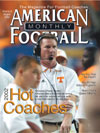AMERICAN FOOTBALL MONTHLY THE #1 RESOURCE FOR FOOTBALL COACHES
Article CategoriesAFM Magazine
|
Stagnant ChangeWhile the hiring of Tyrone Willingham at Notre Dame is a huge step, the overall number of African-Americans hired as head coaches is declining.by: Steve Silverman © More from this issue It’s not about interviews. It’s not about getting close. It’s not about making a good impression. It’s all about getting the job. For minority coaches, it’s time that progress is measured by the actual number of head-coaching slots that get filled. In the past, African-American coaching candidates had a hard time getting interviewed for head-coaching positions and when those interview chances came about, they were done with a wink and a wry smile. “Sure we interviewed a black candidate,” an athletic department administrator might say. “But the guy we hired just blew us away in the interview.”<....The full article can only be seen by subscribers. Subscribe today!
|
|
|||||||
| HOME |
MAGAZINE |
SUBSCRIBE | ONLINE COLUMNISTS | COACHING VIDEOS |
Copyright 2026, AmericanFootballMonthly.com
All Rights Reserved





